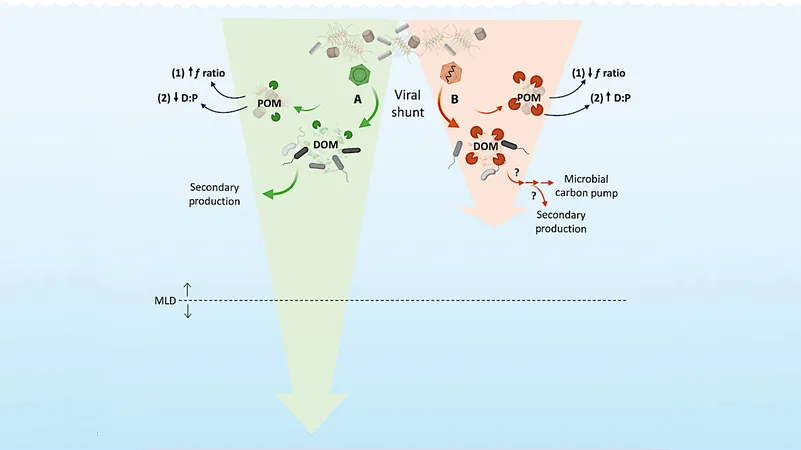
Revolutionary Discovery: RNA Viruses Could Transform Ocean Carbon Cycling!
2025-07-17
Author: Wei
Revelation from the Deep Blue
Researchers from Bar-Ilan University have stumbled upon a groundbreaking finding that could change our understanding of carbon recycling in the oceans. Their latest study reveals that RNA viruses, notorious for infecting microscopic algae called phytoplankton, may dramatically disrupt the way carbon and nutrients are cycled, with far-reaching implications for the global carbon cycle.
The Heroic Phytoplankton
Phytoplankton are often referred to as the lungs of the Earth, generating much of the planet's oxygen and acting as a crucial carbon sink by absorbing carbon dioxide from our atmosphere. But when these tiny powerhouses are struck down by viruses, they unleash dissolved organic matter (DOM) into surrounding waters, a vital food source for marine bacteria tasked with recycling nutrients and carbon.
The Viral Twist: RNA vs. DNA
Published in the esteemed journal Science Advances, the research reveals shocking differences in how RNA and DNA viruses affect phytoplankton. While DOM from a DNA virus infection stimulates bacterial growth, DOM from an RNA virus does the opposite—it complicates recycling efforts. Bacteria have to expend extra energy breaking down complex proteins, drastically affecting the carbon cycle.
A Climate Impact Unveiled
These findings signify that viral infections could influence how much organic carbon sinks to the ocean floor, potentially storing it for extended periods and keeping it out of our atmosphere. Lead researcher Dr. Chana Kranzler warns, "Viruses don't just eradicate phytoplankton; they fundamentally reshape the movement of carbon in our oceans." This alteration in microbial communities may lead to varying amounts of carbon being sequestered in the deep sea.
Unraveling Oceanic Mysteries
With millions of viruses in every drop of seawater, this study unveils a hidden complexity in how our oceans regulate climate. While both RNA and DNA viruses are widespread, their ecological functions are just beginning to be explored. This research opens new pathways for understanding the relationship between phytoplankton and viruses and how these interactions influence the ocean's biogeochemical cycles and, ultimately, Earth's climate.
The Bigger Picture
As we confront the challenges of climate change, understanding these intricate marine ecosystems is more important than ever. The role of viruses in our oceans may be a key puzzle piece in the quest to combat climate change, making this discovery both timely and critical.




 Brasil (PT)
Brasil (PT)
 Canada (EN)
Canada (EN)
 Chile (ES)
Chile (ES)
 Česko (CS)
Česko (CS)
 대한민국 (KO)
대한민국 (KO)
 España (ES)
España (ES)
 France (FR)
France (FR)
 Hong Kong (EN)
Hong Kong (EN)
 Italia (IT)
Italia (IT)
 日本 (JA)
日本 (JA)
 Magyarország (HU)
Magyarország (HU)
 Norge (NO)
Norge (NO)
 Polska (PL)
Polska (PL)
 Schweiz (DE)
Schweiz (DE)
 Singapore (EN)
Singapore (EN)
 Sverige (SV)
Sverige (SV)
 Suomi (FI)
Suomi (FI)
 Türkiye (TR)
Türkiye (TR)
 الإمارات العربية المتحدة (AR)
الإمارات العربية المتحدة (AR)